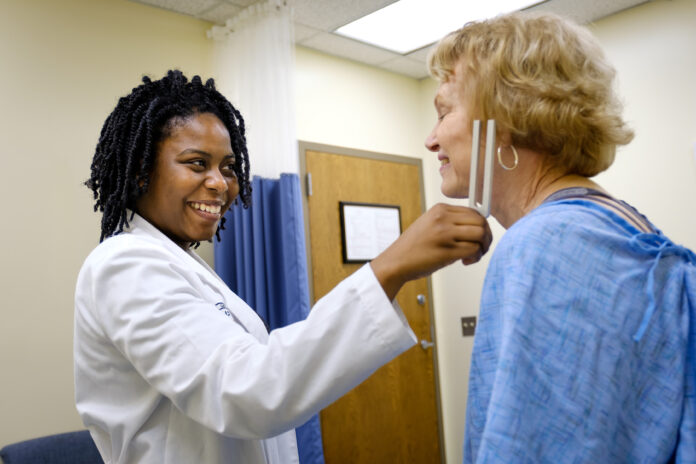
In Georgia, many rural communities face a critical shortage of health care providers. To help address this challenge, Mercer University School of Medicine (MUSM) is shaping the next generation of physicians to return to these areas and make a lasting impact. Through two unique experiences — the population health rotation and rural clerkship experience — Mercer equips students with the knowledge, skills and hands-on experience necessary to practice medicine in rural communities. By immersing students in real-world settings and community health challenges, Mercer is preparing them to become physicians who will not only treat patients but also improve health care outcomes in rural, underserved regions of the state.
Broadening the understanding of community health
The first two years of medical school traditionally focus on studying biomedical sciences and honing clinical skills with standardized patients— trained actors who participate in staged clinical evaluations. However, Mercer incorporates population health curriculum during the students’ early years. This course is designed to broaden their understanding of health beyond individual patients, teaching them to view health from a community-wide perspective.
Through the population health curriculum, students explore non-biological determinants of health, health disparities, rural health care issues, cultural competence, research design, epidemiology, biostatistics and health care systems. This foundational knowledge equips students with the tools to understand and address the broader factors that influence health outcomes.
Students then apply these concepts during a three-week population health rotation in a rural area, which includes both clinical practice and a community needs assessment. Through interviews with local stakeholders and data collection, students identify potential service projects that could help improve health outcomes in their assigned rural community. After discussing project ideas with their faculty advisor, students can implement their initiatives during a follow-up rotation in their fourth year. This immersive experience gives students an in-depth understanding of the critical role that rural physicians play in improving community health.
Providing comprehensive rural clinical experiences
In addition to the population health experience, medical students gain hands-on clinical experience through third-year clerkships in six core specialties: family medicine, internal medicine, pediatrics, obstetrics and gynecology, general surgery, and psychiatry. To help strengthen the state’s pipeline of rural physicians, MUSM introduced a new requirement for students to spend at least two weeks of a core clerkship at a rural clinical site, known as the rural clerkship experience. This requirement will increase to four weeks for the class of 2028. The rural clinical sites include 17 medical centers across rural Georgia, part of a growing network of Mercer’s rural health care partners.
“Mercer has always been focused on the education of well-educated rural physicians for Georgia,” said Jean Sumner, M.D., FACP. “This new program will allow them to experience additional high-quality care being provided by excellent community-responsive physicians. Students will also be able to strengthen their professional network, helping them know there will be other physicians and colleagues when they return to their chosen rural community.”
The main goal of the rural clerkship experience is to expose students to high-quality health care in rural areas and provide them with valuable mentorship from rural physicians. By fostering strong relationships between students and experienced rural physicians, Mercer offers hands-on clinical exposure, including medical procedures, patient interactions and collaborative care, showcasing the diverse opportunities for physicians in rural settings.
Preparing future physicians for rural Georgia
Through the population health curriculum and rural clerkship experience, MUSM prepares its students to become community-oriented physicians who are equipped to meet the challenges of rural health care. By immersing students in real-world clinical practice and population health projects, Mercer helps them gain a clear understanding of how to navigate the complexities of health care delivery in rural settings.
The goal is simple yet profound: to train future physicians to meet the primary care and health care needs of rural medically underserved areas of Georgia. Through these experiential learning opportunities, Mercer hopes to solidify students’ plans to practice in rural Georgia. By equipping medical students with the knowledge, skills and mentorship needed to practice in rural areas, Mercer is actively working to improve access to high-quality health care for all Georgians — no matter where they live.
About Mercer University School of Medicine (Macon, Savannah, Columbus and Valdosta)
Mercer University’s School of Medicine was established in 1982 to educate physicians and health professionals to meet the primary care and health care needs of rural and medically underserved areas of Georgia. Today, more than 60% of graduates currently practice in the state of Georgia, and of those, more than 80% are practicing in rural or medically underserved areas of Georgia. Mercer medical students benefit from a problem-based medical education program that provides early patient care experiences. Such an academic environment fosters the early development of clinical problem-solving and instills in each student an awareness of the place of the basic medical sciences in medical practice. The School opened additional four-year M.D. campuses in Savannah in 2008 and in Columbus in 2021, and a clinical campus in Valdosta in 2024. Following their second year, students participate in core clinical clerkships at the School’s primary teaching hospitals: Atrium Health Navicent The Medical Center and Piedmont Macon Medical Center in Macon; Memorial Health University Medical Center in Savannah; Piedmont Columbus Regional Hospital and St. Francis Hospital in Columbus; and SGMC Health in Valdosta. The School also offers master’s degrees in preclinical sciences and family therapy and Ph.Ds. in biomedical sciences and rural health sciences.









